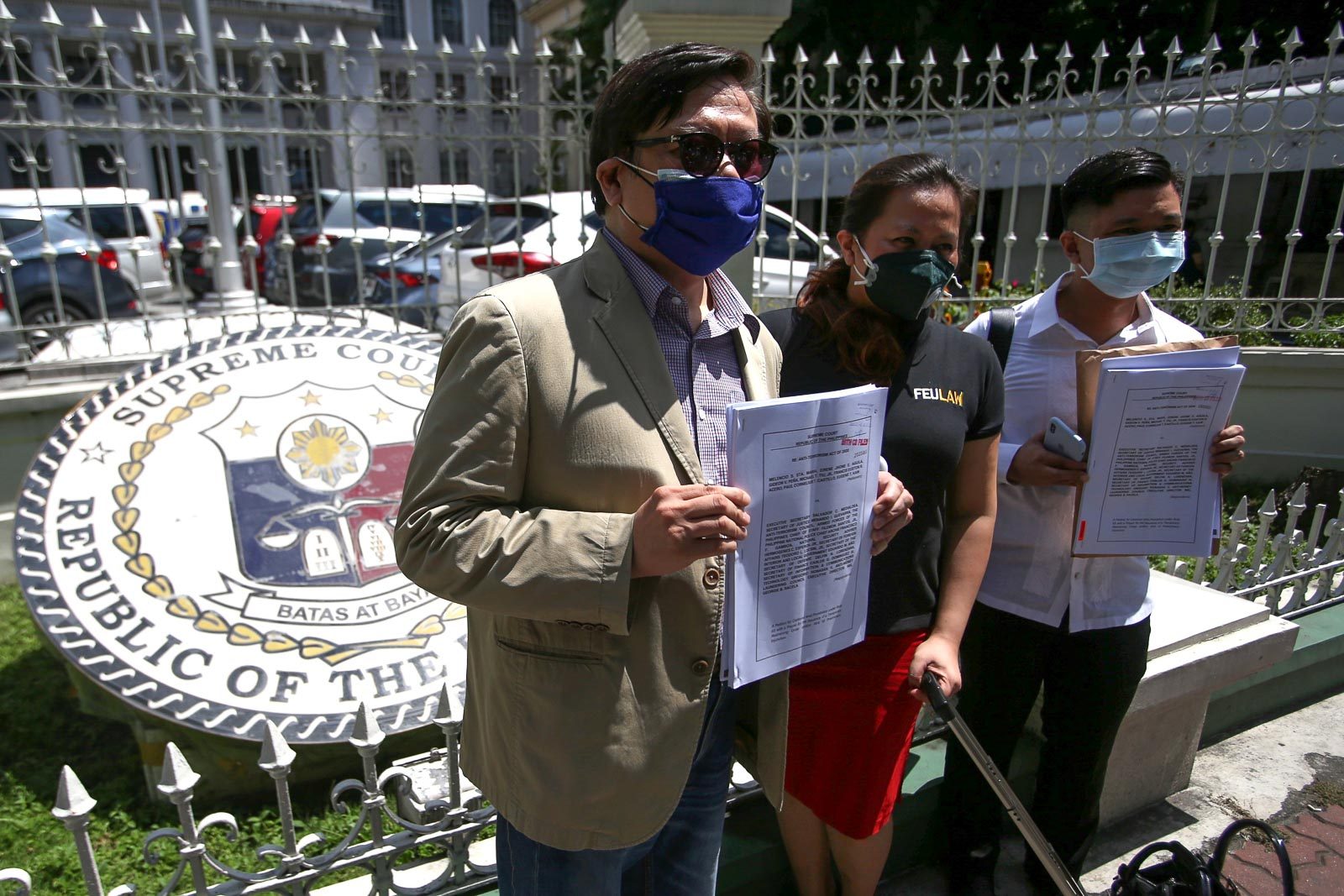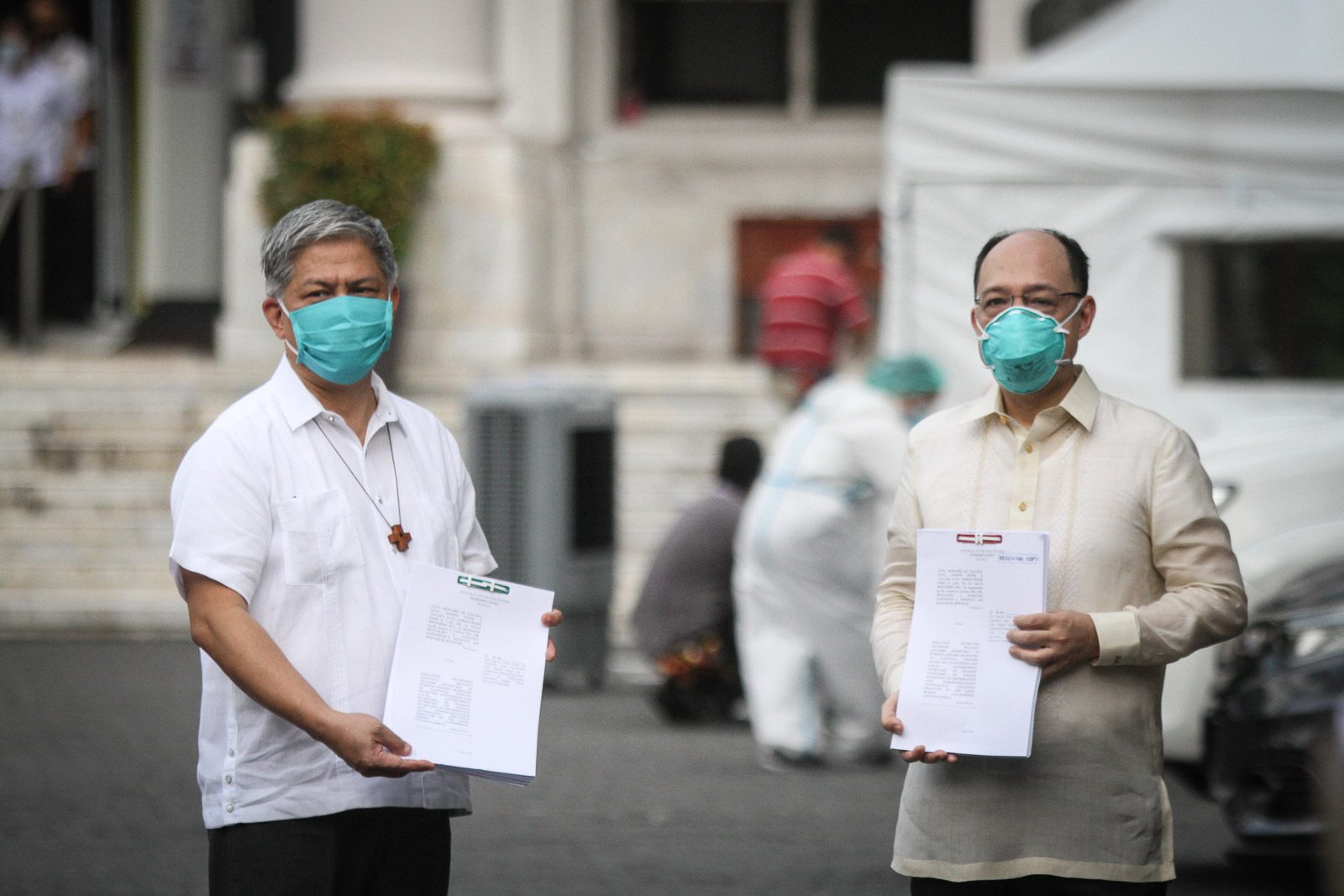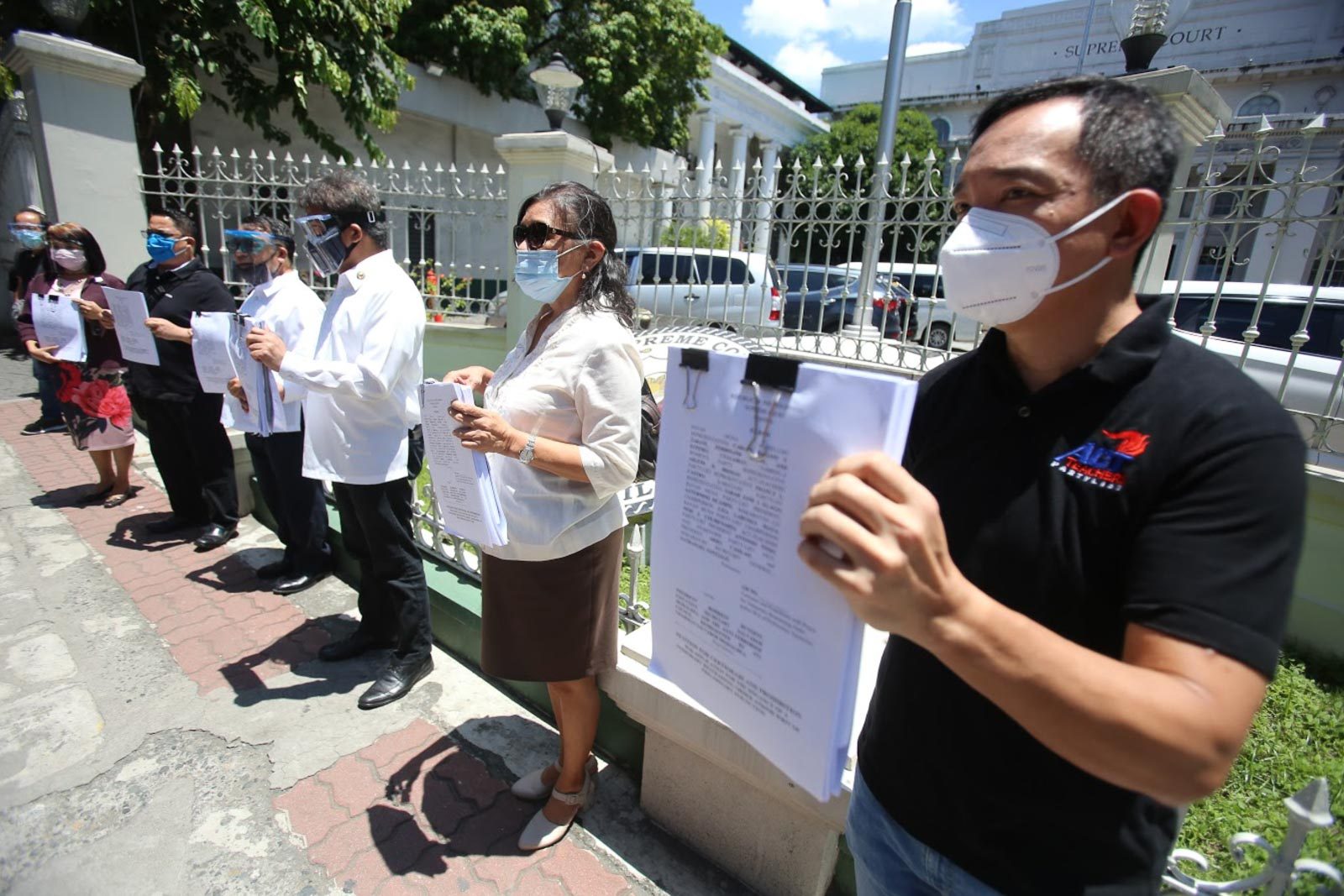SUMMARY
This is AI generated summarization, which may have errors. For context, always refer to the full article.

MANILA, Philippines (5th UPDATE) – The Supreme Court battle against the anti-terror law, signed by President Rodrigo Duterte on July 3, has officially begun.
One group of petitioners was an early bird to the High Court on Monday, July 6, arriving in Padre Faura even before its gates opened, to file their petitions challenging the constitutionality of the Duterte government’s divisive anti-terror law.
The group led by law professor Howie Calleja, which submitted an electronic filing on July 4, Saturday, physically filed its petition first thing Monday.
They were followed by Albay 1st district Representative Edcel Lagman’s staff who filed on his behalf.
Far Eastern University (FEU) law professors, led by Dean Mel Sta Maria, filed the 3rd petition at past 9:30 am, while the progressive lawmakers of the Makabayan bloc filed their petition 11:50 am.
By Rappler’s count, there are at least 8 groups that will be filing petitions; some of them have opted to wait until the law takes effect 15 days after publication.
First petitions
Both the Calleja and FEU petitions are requesting an immediate temporary restraining order (TRO) against Republic Act No. 11479, or the anti-terror law, to stop its effect while the Supreme Court tackles the cases.
Lagman and Makabayan’s petitions want to declare the entire law unconstitutional. Both lawmaker groups also requested for TRO.

The Calleja petition wants to declare Sections 3, 4, 5, 9, 10, 16, 17, 25, 26, 29, and 54 of the law unconstitutional.
The FEU petition wants to declare Sections 4, 5, 6, 7, 8, 9, 10, 11, 12, 25, 26, 27, and 29 unconstitutional. (READ: EXPLAINER: Comparing dangers in old law and anti-terror bill)
The FEU group justified their legal standing by saying that the law’s threat to freedom of speech affects them as educators who want to teach their students “that dissent and activism are part of democracy.”
“With the Anti-Terrorism Act of 2020, these can now be interpreted by the government as constituting terrorism,” said the FEU professors in their 84-page petition.
The FEU petition also fears that because Section 45 lists the Commission on Higher Education (CHED) and the Department of Education (DepEd) as support groups of the anti-terror council (ATC), the agencies might be compelled to change curriculums.
“Can the ATC require the CHED or the Department of Education to formulate a curriculum prohibiting, tempering, or limiting the study of ideologies or advocacies which it suspects as “creating a serious risk to public safety” and therefore “endangers a person’s life” pursuant to Section 4 (a) of the proposed Anti-Terrorism Law?” the petition asked.
Vague and broad
The FEU petition listed down instances where critics and dissenters, and even Vice President Leni Robredo, were charged with inciting to sedition based on suspicion.
Section 4 of the 2020 anti-terror law lists the following definitions of a terror act – which were not found in the 2007 Human Security Act:
- intimidating the general public
- creating an atmosphere or spreading a message of fear
- provoking or influencing by intimidation the government or any of its international organizations
- seriously destabilizing or destroying the fundamental political, economic, or social structures of the country
- creating a public emergency
- seriously undermining public safety
Sections 5, 6, 7, 8, 9, and 10 punish threats, planning, conspiracies, proposals and inciting to commit terrorism as well as recruitment to a terrorist organization. The 2007 Human Security Act only punished conspiracy to commit terrorism.
“The definition of terrorism in Section 4 is so vague and broad such that it can be read to include legitimate and lawful gatherings and demonstrations where people assemble to exercise their freedom of speech, of expression, and of the press,” said the FEU petition.
The FEU petition also pointed out that under Section 4, terrorism is committed “regardless of the stage of execution.”
The FEU petition made an example of Bono’s recent concert in the Philippines where he paid tribute to jailed opposition Senator Leila de Lima, and said phrases like, “You can’t compromise on human rights. That is my soft message to President Duterte.”
“Under the Anti-Terrorism Act of 2020, Bono may be charged with committing terrorism, which is punishable in whatever stage of commission (under Section 4), insofar as he intends to cause interference with the very infrastructure of government with the purpose “to provoke or influence by intimidation the government,” said the FEU petition.
Lagman’s petition also pointed out how the anti-terror law removed a part previously found in the 2007 Human Security Act, which explicitly said that an element of terrorism is to “coerce the government to give in to an unlawful demand.”
“The clear purpose of deleting the element of political motive in the ‘Anti-Terrorism Act of 2020’ is to facilitate the apprehension, prosecution, and conviction of a suspected terrorist without imputing and proving any political or ideological motive,” said Lagman’s petition.
Makabayan’s petition made an example of itself, saying that even though they are members of the House of Representatives, they have for two decades been “treated as enemies of the state.”
“Worse, several of our leaders and members have been killed while others are being deprived of liberty on false charges,” said Makabayan’s petition.
Makabayan’s petition said the broad definitions will give “too much leeway” to charge progressive individuals such as themselves and others who dare express dissent.
“The overbroad and vague provisions on extensive, interference, damage or destruction, and critical infrastructure will give the implementors of the Anti-Terrorism Act of 2020 much leeway to charge these vulnerable speakers for terrorism,” said Makabayan’s petition.

Freezing assets
Sections 25, 26, and 27 deal with the designation and proscription of people as terrorists.
Designation is done by the ATC by the mere finding of probable cause, while proscription is a judicial process where the courts should declare people as terrorists.
The FEU petition pointed out that under Section 25, upon the designation as terrorist by the ATC – not proscription by a court – the anti-money laundering council may start freezing assets.
The FEU petition also pointed out that there’s no mechanism in the law that lets designated people be heard by the ATC first, and no part that indicates where they can appeal to the ATC. This was the same problem with drug lists – there was no clear way by which one could have his or her name removed.
“Certainly, the threat of being designated, declared, and proscribed as a terrorist, terrorist group, organization, or association – coupled with the very real effects of freezing of assets and widespread publication – would cow even the staunchest critics of any administration,” the FEU petition said.
The FEU petition also said that “it is unclear from Section 25 what quantum of evidence must be present to meet the standard of probable cause.”
Section 29
The most controversial of the provisions is Section 29, which authorizes the ATC to order arrests of suspected terrorists without warrants, and to order their detention for up to 24 days before they are required to be brought to court.
In the Constitution, when martial law is declared and the privilege of the writ of habeas corpus is suspended, an arrested person without a warrant must be brought to court within 3 days. (READ: PH situation ‘worse than martial law’ under anti-terror bill – Carpio)
“Section 29 simply cannot survive judicial scrutiny because it allows the arresting officers to unlawfully detain a person arrested on the basis of mere suspicion without having to present him to a court of law for a period that is 21 days longer than what is permitted under the 1987 Constitution during a period of a declared invasion or rebellion when the privilege of the writ is suspended,” said the FEU petition.
The FEU petition justified their facial challenge – or a legal challenge without having to wait for a direct injury to happen – by citing the Cybercrime Law where the Supreme Court allowed facial challenge because the law was vague and it encroached on freedom of speech.
Freedom of speech is a highly protected freedom, and requires a very high bar for restrictions.
The FEU petition said the anti-terror law results in the unconstitutional prior restraint of Filipinos’ free speech.
Sponsors of the law have defended that other countries have even harsher anti-terrorism laws, but Lagman pointed out that countries have different constitutions they must adhere to.
“This is of no moment since our laws must be made and measured in accordance with the standards and prescriptions of the Constitution and consistent with our enviable heritage of democratic institutions,” said Lagman’s petition. – Rappler.com
Add a comment
How does this make you feel?
There are no comments yet. Add your comment to start the conversation.